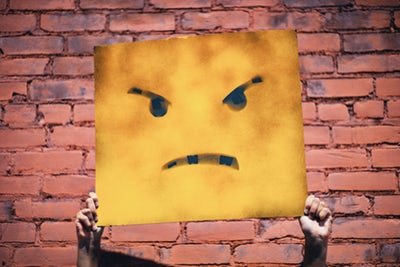Everyone Hates the "Fun-Police"

I am old enough, now, that I have seen the political and social landscape swing to and fro a couple of times and I am starting to notice some repeating patterns. At various points, I have seen both the left and the right become uptight about "acceptable social behavior." I remember when Christian conservatives tried to tell us what we can't joke about and whined about which children's shows and books that were "offensive" to their "righteous" worldview. Now, I see the same sorts of arguments being employed by the overly zealous types in "social justice" crowd. The reasoning changes depending on what it is that the group is upset over but it typically comes down to disapproval of the ideas or their perception of the ideas that are being expressed in some sort of entertainment medium. This is effective at string up outrage among people who agree with these "fun-police." They will yell and scream and make a big scene. The media and the political establishment will get the false impression that the "fun-police" are representative of a much larger group than they actually are and will pander to them in the hopes of exploiting their zeal for political gains. However, everyone else sits back and rolls their eyes when they see the the "fun-police" coming: "Here comes someone to tell us about how having a good time makes us less moral or progressive than they are. Let's make fun of them when they get here." Despite what we may see in the media, the oppression of fun and humor (whether it is coming from the from the left, right, or center and regardless of the particular issue that it is associated with) is a losing strategy. People hate being told not to laugh at what they think is funny and they don't take kindly to demands that they stop enjoying themselves. Over time, we stop taking the outraged seriously, they become the butts of our jokes, and, in the end, they hurt their own causes (even their legitimate ones) because few would willingly associate with someone who is viewed as toxicly self-righteous and utterly ridiculous.
It is usually a good idea to clarify terms and that is true here. When I say "fun-police," I am referring to the individuals, groups, and movements that spend an inordinate amount of time and energy rabidly attacking trivial issues (particularly ones that deal with entertainment, pleasure, or casual behaviors) to the extent that they are seen as "buzzkills," joyless "nags," or overly sensitive "snowflakes." There are, in fact, real reasons to be outraged, from time to time. I do not deny that; however, I also don't think that an off color joke, or film, or song should fall into that category in the vast majority of circumstances, even when I fundamentally disagree with its message. When people become overly focused on those sorts of things, they, in my opinion, wear out any good will that others may have held for their ideas because they appear to be self-righteous and whiny and that greatly weakens their positions.

We may not be aware of it but we are pretty good at picking up on the motivations that may lie beneath the actions of others and when we see the "fun-police" policing our fun, we often get the impression that they seek to elevate their own sense of worth by criticizing others. That is to say, as social creatures, we are able to understand the intent that is driving the things that a person is doing. Flirting is a good example. Even if a person does not say anything that explicitly expresses romantic interest, we can reliably detect that interest, if it is there. We can also identify self-righteousness and that is what many see when they take a long and hard look at the actions of the "fun-police." Someone rolls in and says the joke that you laughed at "isn't funny" or the song that you danced to is "immoral" or "offensive" but there is a second implication hidden in that type of statement. Specifically, it suggests that the outraged is superior to the person who enjoyed the joke or whatever it is that sparked the outrage. That, not surprisingly, tends to rub people the wrong way. We don't enjoy being the target of unsolicited judgment and we are far less likely to positively respond to someone who approaches us with it. That erosion of our good will is amplified because the value judgment against us includes a direct comparison to the judge. It, in this sense, functions as a way of stating that "I [the outraged] am better than you [everyone else]."
The things that the "fun-police" focus on are often extremely trivial which makes them difficult to take seriously, and, ultimately, harms their larger cause. I have seen conservatives, liberals, religious leaders, and social justice people all point to the "offensive" or "immoral" nature of video games and that is a perfect embodiment of this issue. Games are meant to be fun or entertaining for the player. That is their point and the vast majority of the population understands it. When we see some group or person treat them like they are a legitimate threat to "moral" society, that entity starts to look rather silly. Those people claim that a character's outfit is too relieving, the game "promotes violence against the police," or it "teaches kids unchristian values" and, to the rest of us, they start to sound like their priorities are out of order: "There are real problems out there and you are taking the time to judge me for how I dress a fictional character in a fantasy game?" There are countless other non-issues that the "fun-police" make fools of themselves by blowing out of proportion. When we see people dumping too much concern into something that really does not matter, especially when we enjoy the meaningless thing, they just end up looking like "killjoys" and we turn ourselves off to their message.

Since the "fun-police" place themselves in an adversarial position to the rest of us with their implied judgments and because they expend their energy on trivial things, they often become the target of ridicule and are largely ignored. When we hear that games promote murderous misogyny or that books turn kids into gay satanists, we, rightfully, laugh at the person who is saying it. The outrage becomes a joke in our minds. We consume the media that was railed against and giggle, as we sarcastically warn each other: "You'd better be careful. I hear that show will make you disrespect your elders and snort the marijuanas." When a person's message becomes a joke, it no longer has any impact and, even if it had merit (it usually doesn't, when it comes to these types of things, but it is possible), it is rejected by the majority of the population.

It is fine to have a cause and it is fine to try to spread it but it important to direct one's energy where it will actually have an impact. People don't like having their good time broken up by someone who doesn't approve of it. They don't like having their tastes in humor or entertainment being judged and they will ignore individuals and groups who they view as being too focused on frivolous issues. The media and the political machines will latch onto trivial outrage and hype it up because it seems sensational but that does not mean that the majority is on board with its message. If one hopes to change the hearts and minds of the people, it is counterproductive for that person to scream "that's not funny" every time he or she disagrees with a joke. One must make a case for his or her ideas and it must be palatable for it's target audience but that isn't achieved by the act of policing everyone else's fun.
Peace.
All the images in this post re sourced from the free image website, unsplash.com
Hi, take a look at this video! I'm excited! :)
https://steemit.com/psychedelics/@exhibique/i-must-share-it
Congratulations @artisticscreech! You have completed the following achievement on the Steem blockchain and have been rewarded with new badge(s) :
Click here to view your Board of Honor
If you no longer want to receive notifications, reply to this comment with the word
STOPDo not miss the last post from @steemitboard: